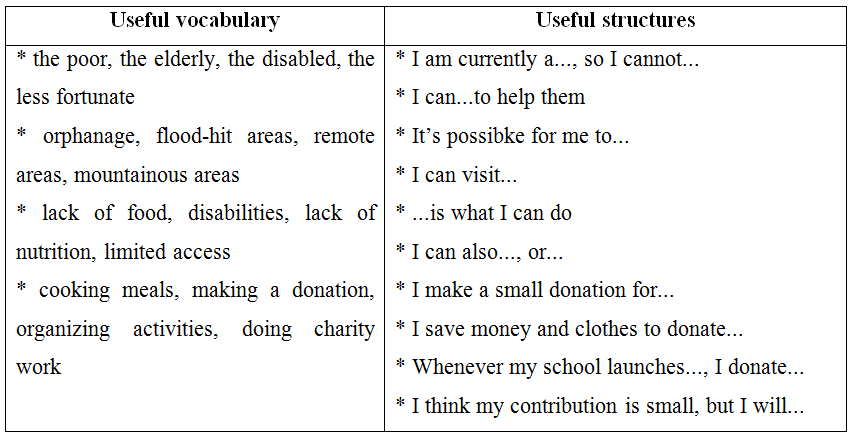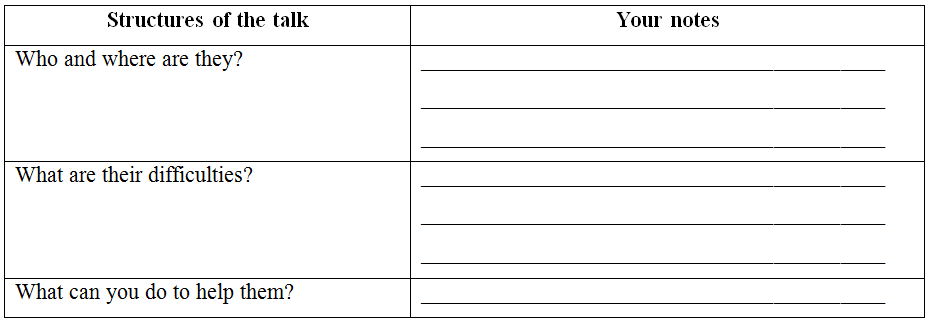Write an essay (150-180 words) about problems that people living in remote and mountainous areas in your country may face.
* You can use the following questions as cues:
* Who are they?
* What are their problems?
* Why do they have those problems?
__________________________________________________________________
__________________________________________________________________
__________________________________________________________________
__________________________________________________________________
__________________________________________________________________
__________________________________________________________________
__________________________________________________________________
__________________________________________________________________ Giải bởi Vietjack
Giải bởi Vietjack
Dịch nghĩa câu hỏi:
Viết một bài văn (150 - 180 từ) về các vấn đề mà những người sống ở vùng sâu vùng xa và miền núi ở nước bạn có thể gặp phải.
Bạn có thể sử dụng các câu hỏi sau đây làm gợi ý:
* Họ là ai?
* Những vấn đề của họ là gì?
* Tại sao họ lại gặp những vấn đề đó?
Gợi ý trả lời:
MAIN IDEAS (Ý chính)
Who (ai)
* ethnic minority (n.phr) (dân tộc thiểu số)
* the underprivileged (n. phr.) (người nghèo)
* the Kinh people (n.phr) (dân tộc Kinh)
* less fortunate people (n. phr.) (người kém may mắn)
Problems (Vấn đề)
* lack of education (n.phr.) (không được đi học)
* isolation (n.) (tách biệt)
* superstition (n.) (mê tín)
* discrimination (n.) (sự phân biệt đối xử)
Reasons (Lý do)
* lack of information (n. phr.) (thiếu thông tin)
* lack of facilities (n. phr.) (thiếu cơ sở vật chất)
* lack of knowledge (n. phr.) (thiếu kiến thức)
* lack of money (n. phr.) (thiếu tiền)
Bài mẫu:
Viet Nam is a multi-ethnic country with over fifty distinct ethnic groups. Most of them are the Kinh people, which account for 87% of the country’s population. The rest are ethnic minority groups who are scattered over mountain areas and are in need.
People living far from developing cities and towns experience considerable disadvantages. Firstly, they have limited access to education and healthcare. This is because there is a lack of facilities for them, and it is also not easy to find enough volunteer teachers and doctors to work in those remote areas.
Secondly, being not well-educated and living without modern electronic devices like televisons or computers make people of ethnic minorities lack updated information. Being not well-informed may lead to unwise decisions. For example, many people there still believe that diseases are caused by ghosts, so they ask a shaman to eliminate ghosts to cure their diseases without going to hospital.
In conclusion, people living in remote areas have many disadvantages so they badly need help. They should be supported so that our nation as a whole can develop evenly.Việt Nam là một quốc gia đa sắc tộc với hơn năm mươi nhóm dân tộc riêng biệt. Hầu hết trong số họ là người Kinh, chiếm 87% dân số đất nước. Phần còn lại là các nhóm dân tộc thiểu số sống rải rác trên các khu vực miền núi và đang cần sự giúp đỡ.
Những người sống xa các thành phố và thị trấn đang phát triển gặp nhiều bất lợị. Thứ nhất, họ có tiếp cận hạn chế với giáo dục và y tế. Đó là vì cơ sở vật chất thiếu thốn, và cũng không dễ dàng để tìm đủ giáo viên và bác sĩ tình nguyện làm việc ở những vùng xa xôi đó.
Thứ hai, việc không được giáo dục đầy đủ cùng với việc không có các thiết bị công nghệ hiện đại như tivi hay máy tính khiến người dân tộc thiểu số thiếu thông tin cập nhật. Không hiểu biết có thể dẫn đến các quyết định không khôn ngoan. Ví dụ, nhiều người ở đó vẫn tin rằng bệnh tật là do con ma gây ra nên chỉ cần mời thầy cúng đến cúng trừ ma là khỏi bệnh mà không cần đến bệnh viện.
Tóm lại, những người sống ở vùng sâu vùng xa chịu nhiều bất lợi nên họ thực sự cần giúp đỡ. Họ nên được hỗ trợ để toàn thể đất nước chúng ta có thể phát triển đồng đều.Gói VIP thi online tại VietJack (chỉ 400k/1 năm học), luyện tập gần 1 triệu câu hỏi có đáp án chi tiết
4. It is_________to use words like ‘dumb’, ‘blind’ and ‘deaf’ to the disabled. (RESPECT)
Talk about what you think you can do to help people in need.
You can use the following questions as cues:
* Who and where are they?
* What are their difficulties?
* What can you do to help them?
Useful languages:

Complete the notes:

Now you try!
Give your answer using the following cues. You should speak for 1-2 minutes.
1. I am currently a..., so I cannot...
2. I can...to help them
3. I can visit...
4. I can also..., or...
5. I make a small donation for...
6. Whenever my school launches..., I donate...
7. I think my contribution is small, but I will...
Now you tick!
Did you ...
- answer all the questions in the task?
- give some details to each main point?
- speak slowly and fluently with only some hesitation?
- use vocabulary wide enough to talk about the topic?
- use various sentence structures (simple, compound, complex) accurately?
- pronounce correctly (vowels, consonants, stress, intonation)?
Let’s compare!
Finally, compare with the sample answer on page 190.
3. He_________blind. He became visually impaired after an accident.
4. He began to teach English for disabled children in 2002. (since)
→____________________________________________
1. She has used a wheelchair since her bones (fracture)__________in the car accident last year.
3. This campaign has been launched since 1999. (for 20 years)
→____________________________________________
1. The charity raises a fund of thousands of dollars for the underprivileged so far.
8. He has been a volunteer for Youth Blood Donor Organisation_________.
1. People in my neighborhood have_________more than $400 to the charity.
1. The last time I saw her was 5 years ago. (for)
→____________________________________________
1. This non-profit organisation_________milk for hundreds of children in this remote area.
13. International Day of Persons with disabilities_________since 1992.